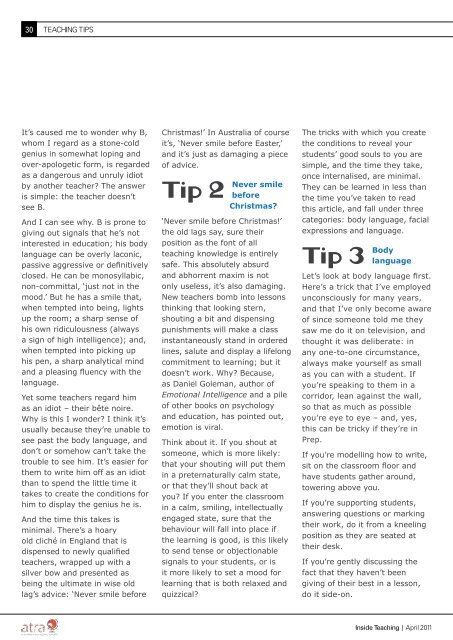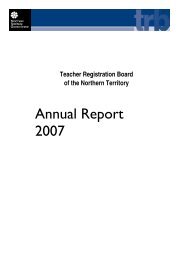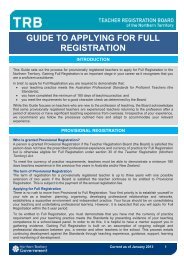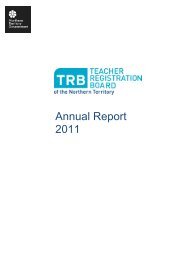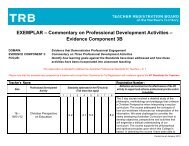First year out Five top tips from Phil Beadle Teacher preparation ...
First year out Five top tips from Phil Beadle Teacher preparation ...
First year out Five top tips from Phil Beadle Teacher preparation ...
Create successful ePaper yourself
Turn your PDF publications into a flip-book with our unique Google optimized e-Paper software.
30 TEACHING TIPS TEACHING TIPS 31<br />
It’s caused me to wonder why B,<br />
whom I regard as a stone-cold<br />
genius in somewhat loping and<br />
over-apologetic form, is regarded<br />
as a dangerous and unruly idiot<br />
by another teacher? The answer<br />
is simple: the teacher doesn’t<br />
see B.<br />
And I can see why. B is prone to<br />
giving <strong>out</strong> signals that he’s not<br />
interested in education; his body<br />
language can be overly laconic,<br />
passive aggressive or definitively<br />
closed. He can be monosyllabic,<br />
non-committal, ‘just not in the<br />
mood.’ But he has a smile that,<br />
when tempted into being, lights<br />
up the room; a sharp sense of<br />
his own ridiculousness (always<br />
a sign of high intelligence); and,<br />
when tempted into picking up<br />
his pen, a sharp analytical mind<br />
and a pleasing fluency with the<br />
language.<br />
Yet some teachers regard him<br />
as an idiot – their bête noire.<br />
Why is this I wonder? I think it’s<br />
usually because they’re unable to<br />
see past the body language, and<br />
don’t or somehow can’t take the<br />
trouble to see him. It’s easier for<br />
them to write him off as an idiot<br />
than to spend the little time it<br />
takes to create the conditions for<br />
him to display the genius he is.<br />
And the time this takes is<br />
minimal. There’s a hoary<br />
old cliché in England that is<br />
dispensed to newly qualified<br />
teachers, wrapped up with a<br />
silver bow and presented as<br />
being the ultimate in wise old<br />
lag’s advice: ‘Never smile before<br />
Christmas!’ In Australia of course<br />
it’s, ‘Never smile before Easter,’<br />
and it’s just as damaging a piece<br />
of advice.<br />
Tip 2<br />
Never smile<br />
before<br />
Christmas?<br />
‘Never smile before Christmas!’<br />
the old lags say, sure their<br />
position as the font of all<br />
teaching knowledge is entirely<br />
safe. This absolutely absurd<br />
and abhorrent maxim is not<br />
only useless, it’s also damaging.<br />
New teachers bomb into lessons<br />
thinking that looking stern,<br />
sh<strong>out</strong>ing a bit and dispensing<br />
punishments will make a class<br />
instantaneously stand in ordered<br />
lines, salute and display a lifelong<br />
commitment to learning; but it<br />
doesn’t work. Why? Because,<br />
as Daniel Goleman, author of<br />
Emotional Intelligence and a pile<br />
of other books on psychology<br />
and education, has pointed <strong>out</strong>,<br />
emotion is viral.<br />
Think ab<strong>out</strong> it. If you sh<strong>out</strong> at<br />
someone, which is more likely:<br />
that your sh<strong>out</strong>ing will put them<br />
in a preternaturally calm state,<br />
or that they’ll sh<strong>out</strong> back at<br />
you? If you enter the classroom<br />
in a calm, smiling, intellectually<br />
engaged state, sure that the<br />
behaviour will fall into place if<br />
the learning is good, is this likely<br />
to send tense or objectionable<br />
signals to your students, or is<br />
it more likely to set a mood for<br />
learning that is both relaxed and<br />
quizzical?<br />
The tricks with which you create<br />
the conditions to reveal your<br />
students’ good souls to you are<br />
simple, and the time they take,<br />
once internalised, are minimal.<br />
They can be learned in less than<br />
the time you’ve taken to read<br />
this article, and fall under three<br />
categories: body language, facial<br />
expressions and language.<br />
Tip 3 Body<br />
language<br />
Let’s look at body language first.<br />
Here’s a trick that I’ve employed<br />
unconsciously for many <strong>year</strong>s,<br />
and that I’ve only become aware<br />
of since someone told me they<br />
saw me do it on television, and<br />
thought it was deliberate: in<br />
any one-to-one circumstance,<br />
always make yourself as small<br />
as you can with a student. If<br />
you’re speaking to them in a<br />
corridor, lean against the wall,<br />
so that as much as possible<br />
you’re eye to eye – and, yes,<br />
this can be tricky if they’re in<br />
Prep.<br />
If you’re modelling how to write,<br />
sit on the classroom floor and<br />
have students gather around,<br />
towering above you.<br />
If you’re supporting students,<br />
answering questions or marking<br />
their work, do it <strong>from</strong> a kneeling<br />
position as they are seated at<br />
their desk.<br />
If you’re gently discussing the<br />
fact that they haven’t been<br />
giving of their best in a lesson,<br />
do it side-on.<br />
If you stand in front of a student<br />
and tell them off, you’re in<br />
a cowboy shoot-<strong>out</strong>. You’ve<br />
signaled with your body that<br />
the student is in a gladiatorial<br />
environment in which the<br />
likelihood is that they’ll be<br />
humiliated or diminished. Sideon,<br />
the confrontational aspect of<br />
the quiet chat disappears, and it<br />
remains just that: a quiet chat, a<br />
communication between souls.<br />
Tip 4 facial<br />
expressions<br />
There’s a facial expression that<br />
should be your default setting:<br />
the smile. With the student<br />
whose company I’m much<br />
enjoying this <strong>year</strong>, the muchmisunderstood<br />
and oft-derided<br />
B, this has been the secret:<br />
every day he has been greeted<br />
by someone who appears to be<br />
pleased to see him (and I am:<br />
the smiles come easily), which<br />
sets the tone for his behaviour.<br />
He’s welcome and wanted<br />
in the class, and is made to<br />
feel it. There’s no stimulus to<br />
cause him to feel undervalued,<br />
misunderstood or insulted.<br />
When it’s time to talk ab<strong>out</strong> the<br />
work – the side-on quiet chat<br />
– a second facial expression<br />
comes in: the sincere raised<br />
eyebrows and furrowed brow<br />
of the ‘none more interested’<br />
expression. We all want to be<br />
valued and taken seriously, and<br />
many of the students I teach<br />
simply aren’t. It takes nothing<br />
to show that you are genuinely,<br />
inside teaching | April 2011 www.atra.edu.au | insideteaching@atra.edu.au<br />
sincerely interested in their<br />
nascent humanity, their fledgling<br />
brilliance, their emotional<br />
landscape.<br />
Tip 5 Language<br />
There are a<br />
few key phrases you can use to<br />
create the conditions for students<br />
to feel cared for and worthwhile.<br />
The first of these is, ‘You are<br />
clever.’ It stunned me that on<br />
The Unteachables, the television<br />
series shown on ABC1 a couple<br />
of <strong>year</strong>s ago, the young people<br />
I was working alongside found<br />
this revelation so strange. The<br />
fact that they were 14 <strong>year</strong>s<br />
old and hadn’t encountered this<br />
phrase before just shows how<br />
vital it is that teachers use it<br />
every single time they feel it.<br />
Often this phrase is all it takes<br />
for a productive relationship to<br />
commence.<br />
A second useful phrase is,<br />
‘Imagine I was a human being<br />
and that I cared ab<strong>out</strong> you, and<br />
then talk to me.’ It’s all too easy<br />
for students to feel that teachers<br />
are, as Neil wrote in his letter to<br />
his bank manager, in The Young<br />
Ones, merely authority figures<br />
of the ‘darling-fascist-bully-boy’<br />
variety whose main function is<br />
to oppress. Identify yourself as<br />
belonging to the same species<br />
as your students, reveal your<br />
humanity openly and nakedly,<br />
and you’ll witness the change in<br />
their countenances as you speak<br />
to them.<br />
The final piece of language that<br />
I think might work, but haven’t<br />
had the guts to try <strong>out</strong> yet is to<br />
look deep into a student’s eyes<br />
and say, ‘I see you.’ Maybe there<br />
hasn’t been a right point yet<br />
to employ this. Alternatively, it<br />
might just be that, ‘I see you,’ is<br />
implicit in everything that a good<br />
teacher does, and possibly it<br />
doesn’t need to be said, but don’t<br />
tell the Na’vi of Pandora.<br />
<strong>Phil</strong> <strong>Beadle</strong> will be teacher-inresidence<br />
at Knox Grammar<br />
School, Sydney, in late July. He<br />
is in Australia through<strong>out</strong> August<br />
to conduct professional learning.<br />
Contact <strong>Phil</strong>@inspired-education.<br />
co.uk His latest book, How to<br />
Teach, published by Crown House,<br />
was reviewed in the October 2010<br />
issue of Inside Teaching.<br />
REFERENCES<br />
Goleman, D. (1995). Emotional<br />
Intelligence. New York Bantam<br />
Books.


